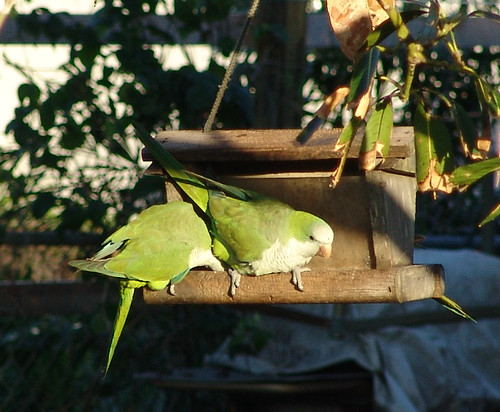Five Sickened With Psittacosis In Argentina, Outbreak Linked To Illegally Sold Birds
 Monday, May 6, 2013 at 5:28
Monday, May 6, 2013 at 5:28  Monk parakeet on bird feeder. Image by: Su Carlson
Monk parakeet on bird feeder. Image by: Su Carlson
Argentine health officials are warning the public not to buy birds sold on the street after at least five people have contracted the very serious disease, psittacosis, according to El Tribuno report May 4.
The five cases in Jujuy province include a married couple who were the first seen at a San Roque hospital. The couple who contracted the disease indicated that the symptoms began within days of buying a monk parakeet at the city bus terminal and parrots were implicated in the infection of the other 3 cases.
The head of Tropical and Emerging Diseases of San Roque hospital, Gustavo Echenique, confirmed the cases and warned that the illegal trader who sold the bird to this couple had about 20 more birds for sale, which could also spread the disease.
All five patients are being treated and are in stable condition.
Most wild and domestic birds can be natural reservoirs of the causative bacteria, Chlamydophila psittaci; however parrots, parakeets, and cockatiels are among the birds most commonly implicated in human infection.
The vast majority of cases of psittacosis, or parrot fever are a direct result of human exposure to pet birds, either as owners or pet shop employees. The remainder of human cases is due to occupational exposure; turkey processing workers, vets, and zoo workers to name a few.
In the bird, infection may not become apparent unless resistance is compromised through conditions like crowding, transport, deficiencies in nutrition or other stressors.
The infection in the bird is mostly gastrointestinal and respiratory with the bird showing the following symptoms: diarrhea, nasal discharge, fever and discharge from the eyes.
The organism is shed in the liquid feces or nasal discharge of a sick bird. Even healthy birds can be carriers of psittacosis and may shed the organism intermittently.
Here it can contaminate the environment, the bird’s cage and the feathers. As the feces dries, the bacteria become airborne from the motion of the feathers and this is where humans can get infected.
The aerosolized, airborne particles are very small and do not settle easily and remain suspended in the atmosphere for long periods of time.
The infection in people can range from an inapparent illness to a systemic disease and severe pneumonia with some fatalities reported.
The onset of disease may be fever, headache, body aches, cough and shortness of breath. The illness is usually self-limiting (up to 2 weeks).
More severe disease may show diarrhea, vomiting and enlarged liver and spleen. The organism can affect some organ systems other that the respiratory. Cases of endocarditis, arthritis and hepatitis have been seen.
Psittacosis is treatable with doxycycline. The fatality rate of patients treated with antibiotics is very low, less than 1%.
To prevent psittacosis, the CHP is advising members of the public to take heed of the following measures:
* Wear gloves and face masks when handling droppings and secretions of birds;
* Wash both hands thoroughly after handling birds;
* Avoid close contacts with birds;
* Disinfect bird cages and surfaces contaminated by bird droppings and secretions; and
* Seek medical treatment if symptoms develop.
 Myiopsitta monachus - Monk Parakeet | in
Myiopsitta monachus - Monk Parakeet | in  Disease,
Disease,  Poaching,
Poaching,  Smuggling,
Smuggling,  Wild bird trade
Wild bird trade 
